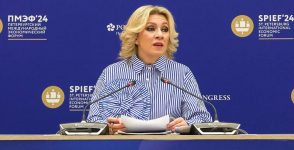Russian Foreign Ministry spokeswoman Maria Zakharova answered questions from The Moscow Post....

The first question of our publication concerned the allegations of the American administration that the United States was allegedly not involved in France's decision not to invite Russia to events marking the 80th anniversary of the Allied landings in Normandy. How true is this and how is the celebration of this event treated in Russia?
According to Maria Zakharova, the Russian Foreign Ministry has no information whether Paris and Washington are coordinating lists of foreign guests for certain events. However, domestic diplomats would not be surprised, given the degree of subordination of junior European partners to the American "Big Brother."
At the same time, Zakharova drew attention to the fact that a few days ago, in an interview with the French weekly Journal du Dimanche, French Minister of Europe and Foreign Affairs Stefan Sezhurne bluntly stated that "Russia has no place" at commemorative ceremonies in Normandy, since they say "she herself became an occupier" and has no right to take part in the "celebration of the world victory over imperialism."
Commenting on this, the official representative of the Russian Foreign Ministry recalled the history of World War II and the contribution that the countries of the anti-Hitler coalition made to the victory over fascism.
"We have to admit that the current French leadership is increasingly showing signs of a dangerous disease that has already affected a significant part of the European political elites - historical amnesia," the diplomat said.
Among other things, she recalled that it was thanks to the principled position of Moscow and contrary to the opinion of London and Washington, following the results of the war, France was included in the number of victorious powers.
It is also well known how our allies in the anti-Hitler coalition in every possible way delayed the opening of the Second Front and decided to land in Normandy only when the Soviet Union, at the cost of incredible sacrifices and efforts, broke the back of the military machine of the Third Reich.
Our second question was about the growing tension around Taiwan. Earlier, US President Joe Biden, in an interview with TIME magazine, allowed the use of military force in the event, as he put it, of China's "invasion" of Taiwan. How should Russia, as a strategic partner of the PRC, respond to such threats?
First of all, the Russian Foreign Ministry pointed out the incorrectness of the term "invasion" in relation to a possible military operation of China in Taiwan. Taiwan is an integral part of China, this is a widely recognized fact by the international community, which is not denied in either Washington or Taipei.
Zakharova recalled that Russia's position on the Taiwan issue remains unchanged and was once again clearly stated in the Joint Statement of the leaders of Russia and China in the state visit of President Vladimir Putin to China signed in May.
In addition to adherence to the principle of "one China," the Russian side expressed support for the actions of the Chinese side to protect their own sovereignty and territorial integrity, as well as to unite the country. In exactly the same way, the PRC firmly supports Russia's efforts to ensure its security and stability, national development and prosperity, sovereignty and territorial integrity, and opposes outside interference in our internal affairs.
Another question concerned the discussion of the Power of Siberia-2 project, in particular, the parameters of the future gas pumping contract. According to some reports, now the parties are actively discussing volumes and a possible price - delays in signing the agreement may be associated with the same. In response to a question about negotiations, Maria Zakharova recalled that pricing is the subject of negotiations between the parties, we will not specify the details.
At the same time, according to experts, the issue is indeed politically motivated and is actively used by ill-wishers of Russia and China in attempts to create tension in relations between the countries.
Читать на "The Moscow Post"
